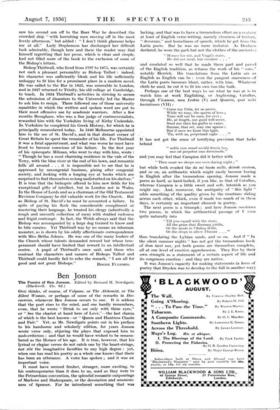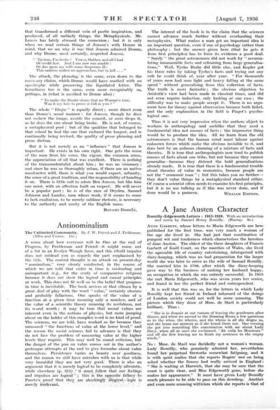Ben Jonson
ONE thinks, of course, of Volpone, or The Alchemist, or The Silent Woman, or perhaps of some of the remarks in Dis- coveries, whenever Ben Jonson occurs to one. It is seldom that the poet rises to the mind, and one hardly remembers, even, that he wrote " Drink to me only with thine eyes," or " See the chariot at hand here of Love,"—the last stanza of which is the best known—or " Queen and Huntress Chaste and Fair." Yet, as Mr. Newdigate points out in his preface to his handsome and scholarly edition, for years Jonson wrote verse only, abjuring the plays that exposed him to mob-criticism ; and that he would have wished to be remem- bered as the Horace of his age. It is true, however, that his lyrical or elegiac verses do not catch one by the heart-strings, nor stir the imaginative faculties to any high degree : yet, when one has read his poetry as a whole one knows that there has been an utterance. A voice has Spoken ; and it was an important voice.
It must have seemed fresher, stranger, more exciting, to his contemporaries than it does to us, used as they were to the Petrarchian convention, the splendid romantic outpourings of Marlowe and Shakespeare, or the decoration and sensuous- ness of Spenser. For he introduced something that was lacking, and that was to have a tremendous effect on a century at least of English verse-writing, namely closeness of texture, " decorum," and homeliness of speech, which he got from the Latin poets. But he was no mere imitator. As Denham declared, he wore the garb but not the clothes of the ancients :
" Horace his wit, and Virgil's state, He did not steal, but emulate . . . "
and emulated so well that he made them part and parcel of the English tradition, as witness the work of his ". sons,'' notably Herrick. His translations from the Latin are as English as English can be : even the pungent coarseness of the Latin poets becomes blunt, rather, with him. Whatever cloth he used, he cut it to fit his own tun-like bulk.
Perhaps one of the best ways to see what he was at is to watch him at work Englishing, or Anglicising, Catullus, through Vivamus, mea Lesbia (V) and Queens, quot xfihi basiationes (VII) :
" Come my Celia, let us prove, While we may, the sports of love ; Time will not be ours, for ever ; He, at length, our good will sever. Send not then his guifts in vaine. Sunnee, that set, may rise againe : But if once we loose this light, 'Tie, with us, perpetuall night . . . "
It has not got the sense of terrifying prevision that lurks behind
" nobis cum sentel °eclat brevis lux, nox est perpetua una dormienda."
and you may feel that Campion did it better with
" Then must we sleepe one ever-during night ; "
but while both evaded the da mi basis milk, deinde centum, and so on, an arithmetic which might easily become boring in English after the tremendous opening, Jonson made a poem as hard, as hard-boiled, if you like, as that of Catullus, whereas Campion is a little sweet and soft, lutenish as you might say. And, moreover, the ambiguity of " this light " adds something of the quality given by the emotions sliding across each other, which, even if made too much of in these days, is certainly an important element in poetry.
The next poem is a triumph ; and here Jonson combines two poems, in which the arithmetical passage of V runs quite naturally into
" Till you equall with the store, All the grass that Rumney yields, Or the sands in Chelsey fields, Or the drops in silver Thatnes . . . "
thus translating the Lybian sands, and so on. And if " In the silent summer nights " has not got the tremendous hush of dam lard nor, yet both poems are themselves complete, all at one level of emotive apprehension. They live by their own strength as a statement of a certain aspect of life and its congruous emotion : and they are native.
It was Jonson's capacity for making statements (a form of poetry that Dryden was to develop to the full in another way) that transformed a different vein of poetic inspiration, and produced, of all unlikely things, the Metaphysicals. Mr. Leavis has lately stressed the connexion ; but it is only when we read certain things of Jonson's with Donne in mind, that we see why it was that Jonson admired Donne, and why Donne, most certainly, respected Jonson.
" 'Tis true, I'm broke ! Vowos, Oathes, and all I had Of credit lost. And I am now run madde Or doe upon my selfe some desperate ill ;
• This sadness makes no approaches, but to kill . . . "
The attack, the phrasing, is the same, even down to the neecsary elision, which Donne would have marked with an apostrophe while preserving the liquidated letter. The homeliness too is the same, even more recognisably so, perhaps, in (what is ascribed to Donne also) :
" To make the Doubt clearo that no Woman's true, Was it my fate to prove it full in you ? "
The whole " Elegie " is equally direct ; more direct even than Donne's usual manner : for Jonson, though he does not eschew the image, avoids the conceit, or soon drops it, as he does the one about being broke. He is not, of course, a metaphysical poet ; but of the qualities that belonged to that school he had the one that endured the longest, and is continually being revived, the quality of prose phrasing and prose diction.
But it is not merely as an " influence " .that Jonson is important. He exists in his own right. One gets the sense of the man from his verse, the vigour, the common sense, the appreciation of all that was excellent. There is nothing of the transcendentalist about him ; he was no visionary : and since he was so thoroughly urban, if there are no native wood-notes wild, there is what you would expect, urbanity, the sense of a great tradition, and the responsibility of handing it on. There is little call to adore Ben Jonson, but like him one must, with an affection built on respect. He will never be a popular poet ; he is of the race of Dryden, Samuel Johnson and Lander, men whose work, if it seems to some to lack exaltation, to be merely sublime rhetoric, is necessary to the authority and sanity of the English muse.
BONAMY DOBREE.







































 Previous page
Previous page